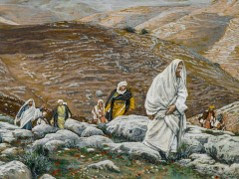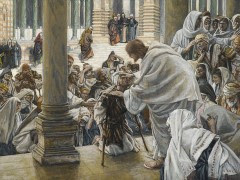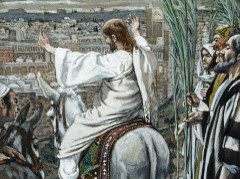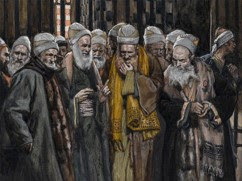Greetings in the name of Father, Son and Holy Spirit.
Lift up your heads, O gates! And be lifted up, O ancient doors, that the King of glory may come in. (Psalm 24:7)
Has there been a king ever who humbled himself before his own people, and serving his own people rather than ruling over? In my knowledge, there was none except one, whose name was Jesus Christ. He was truly the king, but he did not rule over His own people. He always loved and served His people. Jesus said to His disciples:
Greater love has no one than this, that someone lay down his life for his friends. (John 15:13)
He revealed His mission on earth again to His disciples, and He loved His disciple till the end. This is the love of Jesus Christ. All of us, His children, are equally loved by Jesus because He is love.
As the Scripture foretold, Jesus headed to Jerusalem to complete His ultimate mission on earth to save us by offering up His own body as the once-for-all sacrifice for all of us so that we have eternal life through Him.
 On the way to Jerusalem for His final destination on earth, Jesus reached the town of Jericho. Jericho was situated on the floor of the Jordan Valley, It (meaning, the ‘city of palm trees’) is a lush oasis surrounded by desert, watered by a spring that never runs dry. Consequently, it has lush vegetation in an otherwise dry and arid area. Most importantly, Jericho was the first city that the Israelites had to go through in order to get into the Promised Land. As soon as they cross the Jordon River from east, the Israelites confronted with this strong and completely fortified city. Rather than being in fear or fighting with their own strength, through faith, Joshua and his fellow Israelites came to God, received His command, and exactly followed the command. The command was not an easy one to follow because it did not make sense to any right-minded human beings. But in faith, they circled the wall of Jericho seven days as commanded. Please imagine what actually happened: There was the strong enemy waiting for the Israelites inside the fortified city protected by the strong wall, and the ex-slaves from Egypt were circling the wall once a day while blowing horns and being led by priests. How absurd it was! However, they faithfully followed the God’s command. On the seventh day, they circled seven times, and they shouted together as commanded in faith. Then the strong wall of Jericho suddenly fell down before shout of the Israelites, i.e., before the power of God. The Israelites rushed into the city, and conquered. It was a huge victory in faith for the Israelites. Although it was huge, the victory was of this world. On the other hand, Jesus Christ entered Jericho with His disciples for the victory of eternity by defeating the Satan once for all, which liberated all of His people from the bondage of all sins. His entry to Jericho was the prelude of this final victory over the Satan, our enemy.
On the way to Jerusalem for His final destination on earth, Jesus reached the town of Jericho. Jericho was situated on the floor of the Jordan Valley, It (meaning, the ‘city of palm trees’) is a lush oasis surrounded by desert, watered by a spring that never runs dry. Consequently, it has lush vegetation in an otherwise dry and arid area. Most importantly, Jericho was the first city that the Israelites had to go through in order to get into the Promised Land. As soon as they cross the Jordon River from east, the Israelites confronted with this strong and completely fortified city. Rather than being in fear or fighting with their own strength, through faith, Joshua and his fellow Israelites came to God, received His command, and exactly followed the command. The command was not an easy one to follow because it did not make sense to any right-minded human beings. But in faith, they circled the wall of Jericho seven days as commanded. Please imagine what actually happened: There was the strong enemy waiting for the Israelites inside the fortified city protected by the strong wall, and the ex-slaves from Egypt were circling the wall once a day while blowing horns and being led by priests. How absurd it was! However, they faithfully followed the God’s command. On the seventh day, they circled seven times, and they shouted together as commanded in faith. Then the strong wall of Jericho suddenly fell down before shout of the Israelites, i.e., before the power of God. The Israelites rushed into the city, and conquered. It was a huge victory in faith for the Israelites. Although it was huge, the victory was of this world. On the other hand, Jesus Christ entered Jericho with His disciples for the victory of eternity by defeating the Satan once for all, which liberated all of His people from the bondage of all sins. His entry to Jericho was the prelude of this final victory over the Satan, our enemy.Jesus was on way to Jerusalem as prophesized, but Jesus had never forgotten of loving those who were suffering and in needs, as He always did. As Jesus and His disciples were entering in Jericho, a large crowd followed him. A blind beggar named Bartimaeus (son of Timaeus) was sitting beside the road. When Bartimaeus heard that Jesus of Nazareth was nearby, he began to shout, “Jesus, Son of David, have mercy on me!”
“Be quiet!” many of the people yelled at him.
This was a typical response of the people around Jesus. How much contrast can we see between Jesus and the people around Him? Jesus loves those who were in need like Bartimaeus, who was blind and a beggar, but the people yelled at him. The beggar’s life was miserable, but nobody cared for him. They treated Bartimaeus as a nuisance, which just hindered their desired to listen to Jesus’ message and see His face. The poor blind beggar Bartimaeus was kept from approaching Jesus to receive His mercy and love.
But Bartimaeus only shouted louder, “Son of David, have mercy on me!”
The blind beggar Bartimaeus did not deterred by the crowd who discouraged him. What can we learn from Bartimaeus? Don’t be discouraged, fix eyes on Jesus, and continue approaching to Jesus. Also we need to expect that sometimes we would get a rejection from the people around us as the blind beggar Bartimaeus did experience.
When Jesus heard him, he stopped and said, “Tell him to come here.”
Yes, Jesus never ignores even such a small voice of the poor blind beggar who were being treated harshly by the people around him. That’s why we are continue being encouraged, having hope with assurance in Jesus. Like Bartimaeus, just shout to Him and don’t look at others around us. Fix eyes on Jesus, because mercies flow from Jesus. Jesus, who dearly loves us, surely answers even the tiniest voice in our heart, which was vocalized through our mouth in prayer to Jesus.
So they called the blind man. “Cheer up,” they said. “Come on, he’s calling you!”
This is how people usually respond. As soon as Jesus paid attention to Bartimaeus, the people around Bartimaeus suddenly changed. They all became the friends of Bartimaeus. Yes, the world is not trustworthy. Except Jesus, nobody is faithful. Jesus loved His disciples (and us) to the end. Remember that His disciples fled when Jesus was captured, and Peter, who used to say that I would die with Jesus, disowned Jesus three times. Then Jesus looked at Peter directly as Peter was disowning Jesus with his own mouth silently. Jesus heart was filled with compassionating on Peter’s weakness in spirit and faith. Later, the resurrected Jesus found Peter, and He never blamed Peter nor asked why. He just showed His love to Peter while mending Peter’s guilty heart in shame before Jesus.
Bartimaeus threw aside his coat, jumped up, and came to Jesus.
“What do you want me to do for you?” Jesus asked. (Mark 10:50)
“My Rabbi,” the blind man said, “I want to see!”
And Jesus said to him, “Go, for your faith has healed you.” (Mark 10:52a)
Instantly the man could see, and he followed Jesus down the road. This is the reason why the crowd was always with Jesus. But Jesus was a humble king and full of love and mercy.
 After healing the blind man, Jesus left Jericho, and went on toward Jerusalem, walking ahead of his disciples. As he came to the towns of Bethphage (meaning ‘place with young figs) and Bethany on the Mount of Olives, where Mary, Martha and Lazarus lived. (Jesus revived Lazarus from death before.) Then Jesus sent two disciples ahead. “Go into that village over there,” he told them. “As you enter it, you will see a young donkey tied there that no one has ever ridden. Untie it and bring it here. If anyone asks, ‘Why are you untying that colt?’ just say, ‘The Lord needs it.’”
After healing the blind man, Jesus left Jericho, and went on toward Jerusalem, walking ahead of his disciples. As he came to the towns of Bethphage (meaning ‘place with young figs) and Bethany on the Mount of Olives, where Mary, Martha and Lazarus lived. (Jesus revived Lazarus from death before.) Then Jesus sent two disciples ahead. “Go into that village over there,” he told them. “As you enter it, you will see a young donkey tied there that no one has ever ridden. Untie it and bring it here. If anyone asks, ‘Why are you untying that colt?’ just say, ‘The Lord needs it.’”Jesus always prepares ahead of His people before asking for His people to His will. This is true to not just for the disciples, but all of us. This is our faith and also assurance.
So they went and found the colt, just as Jesus had said. And sure enough, as they were untying it, the owners asked them, “Why are you untying that colt?”
And the disciples simply replied, “The Lord needs it.
They said what Jesus had told them to say, and they were permitted to take it. Then they brought the colt to Jesus and threw their garments over it, and he sat on it. Jesus was the King of kings, and the Lord of all lords on earth, but he was humbly sat on the colt. At the time of Jesus, all kings rode on horses, to show off their power and majesty, but Jesus was totally opposite. He humbly rode on a colt to share his meekness and care for His people.
The above took place to fulfill the prophesy foretold by Prophet Zachariah (Zac 9:9) that said,
“Tell the people of Jerusalem,
‘Look, your King is coming to you.
He is humble, riding on a donkey—
riding on a donkey’s colt.’” (Matthew 21:5)
Many in the crowd spread their garments on the road ahead of him, and others spread leafy branches they had cut in the fields. Jesus was in the center of the procession, and the people all around him were shouting,
“Hosanna! ”
“Blessed is he who comes in the name of the Lord!”
“Blessed is the coming kingdom of our father David!”
“Hosanna in the highest heaven!” (Mark 11:9b-10)
0he entire city of Jerusalem was in an uproar as he entered. “Who is this?” they asked.
And the crowds replied, “It’s Jesus, the prophet from Nazareth in Galilee.”
His disciples were in joy as they entered in Jerusalem with Jesus. All around them shouted and praised Jesus. They felt that finally their days came. From now on, Jesus would rule, and they would occupy good positions with Jesus. Yes, His disciples didn’t understand at the time that this was a fulfillment of prophecy, not for the glory to come to Jesus and them on earth. But after Jesus entered into his glory, they remembered what had happened and realized that these things had been written about Him.
However, some of the Pharisees among the crowd said, “Teacher, rebuke your followers for saying things like that!”
They were jealous and also in fear of Jesus. They were the teachers respected by the people in Jerusalem. They heard praises given to Jesus, which came from the same mouths of the same people. Most importantly, they did not believe Jesus as the Messiah, although they had waited the Messiah for long time.
He replied, “If they kept quiet, the stones along the road would burst into cheers!” (Luke 19:40)
Jesus responded with the magnitude of the joy of Heaven and earth about the fulfillment of all prophesies foretold before Him – His death and resurrections for all believers according to God’s salvation plan.
As Jesus came closer to the Jerusalem Temple, he began weeping, and lamented,
“Before long your enemies will build ramparts against your walls and encircle you and close in on you from every side. They will crush you into the ground, and your children with you. Your enemies will not leave a single stone in place, because you did not recognize it when God visited you.” (Luke 1943-44)
Jesus foresaw the destruction of the Jerusalem and the Temple, and He wept. Then as he entered the Temple and began to drive out the people selling animals for sacrifices.
He said to them, “The Scriptures declare, ‘My Temple will be a house of prayer,’ but you have turned it into a den of thieves.” (Luke 19:46)
Jesus cleaned up the Temple to prepare for the ultimate offering of Himself for all. This very act directly challenged the teachers of religious law, and the other leaders of the people, and they began planning how to kill Jesus as prophesized. The humble King, Jesus, entered in Jerusalem, He cleaned the Temple, and He was ready for being sacrificed like a lamb before cross. All prophecies about the Savior was about to be fulfilled. Without knowing this, the people in Jerusalem were in joy. Jesus wept, and His sorrow was not just for the physical destruction of the Temple to come but for the people in Jerusalem who did not know what was really happening and the Pharisees who were plotting to kill Jesus without knowing the truth. Soon Jesus would be offered as a random for all people to purchase freedom from the bondage of all sins.
Today is Palm Sunday, which is the day that we all raise high our hands with Palm branches. Our humble King and Savior entered in Jerusalem on a colt. Today we open our hearts to receive Jesus as our King. Some would be disturbed by our King, Jesus like the Pharisees who then plotted to kill Jesus. But today we, His children, truly rejoice in Him, because our salvation came through the humble King, Jesus. No other kings are like Jesus. All kings before Jesus demanded, but Jesus, the truly King, gave — lovingly gave out Himself for us. Today, we praises His name. We praise Jesus with all our hearts and minds and all our strength, because He was truly worthy of our praises. Amen!
Let everything that breathes sing praises to the LORD!
Praise the LORD! (Psalm 150:6)






